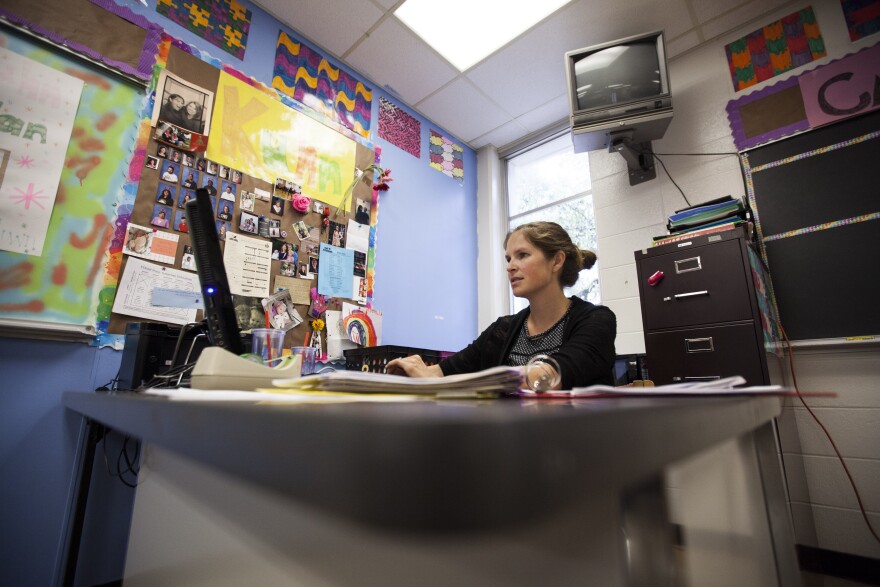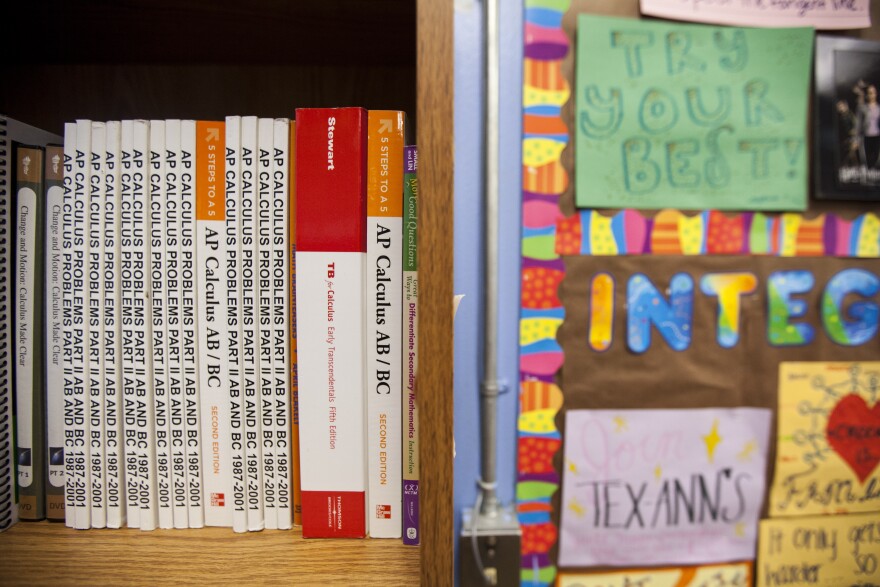Austin ISD offers Advanced Placement courses and tests at all of its schools, but the percentage of students who score high enough on the AP tests to receive college credit varies from campus to campus.
According to district data, students in schools with majority low-income students are more likely to fail Advanced Placement tests than students in schools with higher-income students. In low-income schools, students are often not taking Advanced Placement tests at all, instead, focusing on other ways to receive college credit in high school, like dual credit.
Lou Kuhn teaches Advanced Placement calculus and dual enrollment* pre-calculus at Crockett High School, where she's been a teacher for 11 years. She's known around campus for her dance videos that she makes with her students.
Kuhn is an experienced teacher who has received multiple AP course trainings by the College Board, but she’s very open about something other teachers may be less likely to admit.

“Most of my kids don’t pass the AP test," Kuhn says. “I just look at how much math they have learned, and I find that to be successful.”
Passing an AP test means scoring a score of three, four or five on a one through five scale
In 2015, 19 students at Crockett took the AP Calculus exams, but fewer than five students passed. Kuhn says, when she looks at other schools with similar student populations, the AP calculus class sizes are lower.
“For me, it’s more important for kids to get exposure than to identify the kids that are going to pass," Kuhn says. "At the end of the year, there’s a lot of kids who don’t take the AP calculus class because the test is $85 and a lot of our kids can’t afford that.”
Two-thirds of the students at Crockett come from low-income families. Kuhn says she works with the students who really want to score well, but she doesn't necessarily make passing the test the focus of her class.
“I ask them how many of them can go home and have their parents help them with their homework, and most of them can't," Kuhn says. "And I ask them how many want to grow up to be parents who can help their kids with their homework, and all of them want to. Everybody wants to be able to help their kids. The more you know, the more you’re going to be able to help your kids later.”
The situation is similar at other AISD schools that are majority low-income. Few students pass the AP exams. At many of these schools, Austin ISD has transformed them into Early College High Schools, where students can take dual credit classes at Austin Community College. But at high schools with students from higher income families, like Bowie and McCallum, nearly 90 percent of students who take the AP calculus test pass it.
Kuhn says the test scores aren't always the best way to show where her kids are headed. Sometimes, Kuhn says her students take the AP class, but don’t take the test.
“All of my kids who are going into engineering, they’re going to recommend they take calculus at the school they’re going to," Kuhn says. "So I had a couple of kids who didn’t take it. If you’re going to Baylor, they only accept fives. I had a kid going to Georgetown. They only accept fives. So, a lot of people have been opting out, and as a school we shouldn’t pressure them to take a test that doesn’t mean that much.”
Kuhn says if her students end the year with more confidence that they can do math, that’s just as important as passing the AP test.
Note: When the number of students in district data falls between one and four, Austin ISD redacts that number to protect student privacy. KUT counted each redacted cell as one student, so all numbers between zero and five are approximate.
*This post was updated to clarify Lou Kuhn is a dual enrollment teacher through UT's On Ramps program.




